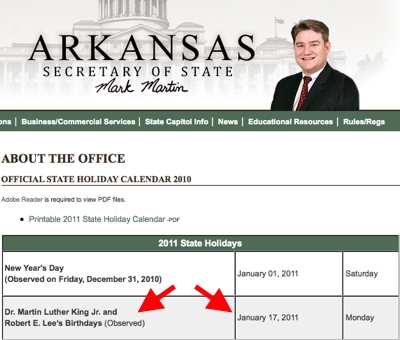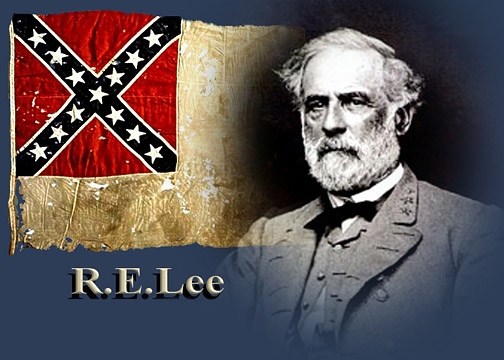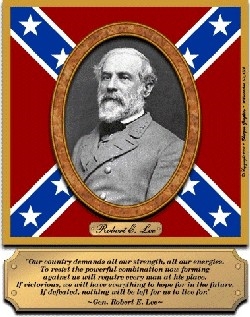Robert E. Lee Day 2025 is on Monday, January 20, 2025: Robert E. Lee biography?
Monday, January 20, 2025 is Robert E. Lee Day 2025.
As an Amazon Associate I earn from qualifying purchases.

Robert Edward Lee was born on January 19, 1807.
Death on October 12, 1870.
Educated in the Alexandria, Virginia.
Obtained appointment to West Point in 1825.
On June 30, 1831, he married Mary Ann Randolph Custis. They had seven children.
During the Mexican War, Robert E. Lee was promoted to Colonel due to his gallantry and distinguished conduct in performing vital scouting missions.
In 1852, he became Superintendent of the Military Academy.
In 1855, Secretary of War Jefferson Davis transferred Lee from staff to line and was commissioned Lieutenant Colonel 2nd Cavalry. He was then sent to West Texas, where he served from 1857-1861.
In February of 1861, General Winfield Scott recalled Lee from Texas when the lower South seceded from the Union. When Virginia withdrew from the Union, Lee resigned his commission rather than assist in suppressing the insurrection. His resignation was two days following the offer of Chief of Command of U.S. forces under Scott. He then proceeded to Richmond to become Commander-in-Chief of the military and naval forces of Virginia. When these forces joined Confederate services, he was appointed Brig. Gen. in the Regular Confederate States.
Lee returned to Richmond in March of 1862 to become military advisor to President Davis.
On April 9, 1865, Lee surrendered to Ulysses S. Grant at the village of Appomattox Court House.
After the surrender, Lee returned to Richmond. He assumed the presidency of Washington College (now Washington and Lee University).

describe the military tactics of general robert e lee?
Robert E. Lee (1807-1870), brilliant Confederate general, whose military genius was probably the greatest single factor in keeping the Confederacy alive through the four years of the American Civil War.
Lee was born on January 19, 1807, in Stratford, Virginia, the son of Lighthorse Harry Lee, and was educated at the U.S. Military Academy. He graduated second in his class in 1829, receiving a commission as second lieutenant in the engineers. He became first lieutenant in 1836, and captain in 1838. He distinguished himself in the battles of the Mexican War and was wounded in the storming of Chapultepec in 1847; for his meritorious service he received his third brevet promotion in rank. He became superintendent of the U.S. Military Academy and later was appointed colonel of cavalry. He was in command of the Department of Texas in 1860, and, early the following year, was summoned to Washington, D.C., when war between the states seemed imminent. President Abraham Lincoln offered him the field command of the Union forces, but Lee declined. On April 20, three days after Virginia seceded from the Union, he submitted his resignation from the U.S. Army. On April 23 he became commander in chief of the military and naval forces of Virginia. For a year he was military adviser to Jefferson Davis, president of the Confederate States of America, and was then placed in command of the army in northern Virginia. In February 1865 Lee was made commander in chief of all Confederate armies; two months later the war was virtually ended by his surrender to General Ulysses S. Grant at Appomattox Court House. His great battles included those of Antietam, Chancellorsville, Fredericksburg, and Gettysburg. see Civil War, American; see also separate articles on the battles mentioned.
The masterly strategy of Lee was overcome only by the superior resources and troop strength of the Union. His campaigns are almost universally studied in military schools as models of strategy and tactics. He had a capacity for anticipating the actions of his opponents and for comprehending their weaknesses. He made skillful use of interior lines of communication and kept a convex front toward the enemy, so that his reinforcements, transfers, and supplies could reach their destination over short, direct routes. His greatest contribution to military practice, however, was his use of field fortifications as aids to maneuvering. He recognized that a small body of soldiers, protected by entrenchments, can hold an enemy force of many times their number, while the main body outflanks the enemy or attacks a smaller force elsewhere. In his application of this principle Lee was years ahead of his time; the tactic was not fully understood or generally adopted until the 20th century.
Lee applied for but was never granted the official postwar amnesty. He accepted the presidency of Washington College, now Washington and Lee University, in the fall of 1865; within a few years it had become an outstanding institution. He died there on October 12, 1870. Lee has long been revered as an ideal by Southerners and considered a figure of national pride by many Americans. His antebellum home is now known as Arlington House, the Robert E. Lee Memorial, and is a national memorial. In 1975 Lee's citizenship was restored posthumously by an act of the U.S. Congress.

Who was Robert lee?
Robert E. Lee was the commander of the CSA troops, and in spite of the myth, he had a propensity for disregarding orders. He was loved by his troops, true. However, he was ordered by Jeff Davis to take Washington, D.C. not wander around the Pennsylvania countryside. He also made the mistake thinking that his troops, Under Picket, were invulnerable. He ordered Picket to charge across a mile of open field to make a frontal assault on a fortified stone fence where the Union Army was positioned AGAINST the advise of his own generals. Had Lee assaulted the Union's Northern flank a second time, he could have broken the Union's line, and maybe, should he have actually been inclined to follow orders, have taken DC. It is hard to say beyond the battle of the day. He was 85 miles north of DC.
Sorry if this answer is long, but when it comes to Robert E. Lee there is allot of myth with little truth.




















